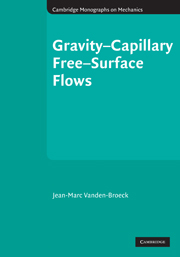Book contents
- Frontmatter
- Contents
- Preface
- 1 Introduction
- 2 Basic concepts
- 3 Free-surface flows that intersect walls
- 4 Linear free-surface flows generated by moving disturbances
- 5 Nonlinear waves – asymptotic solutions
- 6 Numerical computations of nonlinear water waves
- 7 Nonlinear free-surface flows generated by moving disturbances
- 8 Free-surface flows with waves and intersections with rigid walls
- 9 Waves with constant vorticity
- 10 Three-dimensional free-surface flows
- 11 Time-dependent free-surface flows
- References
- Index
11 - Time-dependent free-surface flows
Published online by Cambridge University Press: 07 September 2010
- Frontmatter
- Contents
- Preface
- 1 Introduction
- 2 Basic concepts
- 3 Free-surface flows that intersect walls
- 4 Linear free-surface flows generated by moving disturbances
- 5 Nonlinear waves – asymptotic solutions
- 6 Numerical computations of nonlinear water waves
- 7 Nonlinear free-surface flows generated by moving disturbances
- 8 Free-surface flows with waves and intersections with rigid walls
- 9 Waves with constant vorticity
- 10 Three-dimensional free-surface flows
- 11 Time-dependent free-surface flows
- References
- Index
Summary
Introduction
The first ten chapters of this book were devoted to steady free-surface flows. An equally important topic is that of time-dependent free-surface flows. Boundary integral equation methods can still be used to investigate these problems. The idea is to ‘march in time’ and to solve at each time step a linear integral equation similar to those derived in the previous chapters, by using Cauchy integral equation formula or Green's theorem. Such methods have been developed and used by many authors (see for example and the references cited in these papers). In particular, results have been obtained for breaking waves. An obvious use of time-dependent codes is to study the stability of steady solutions.
In this chapter we will confine our attention to one type of time-dependent free-surface flow, namely gravity–capillary standing waves. We will solve the problem by a series expansion similar to that used in Section 5.1 to study periodic travelling waves. The analysis follows Vanden-Broeck closely. The choice of this problem is motivated by the fact that gravity–capillary standing waves have properties similar to those of Wilton ripples (see Section 6.5.3.1).
We note that a proof of the existence of nonlinear gravity standing waves was provided only recently.
Nonlinear gravity–capillary standing waves
The concept of linear standing waves was introduced in Section 2.4.3. Here we extend the theory of standing waves to the nonlinear regime.
- Type
- Chapter
- Information
- Gravity–Capillary Free-Surface Flows , pp. 301 - 307Publisher: Cambridge University PressPrint publication year: 2010



